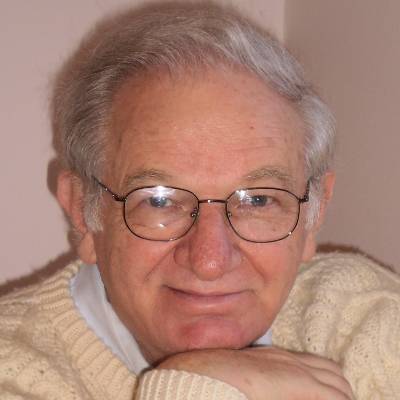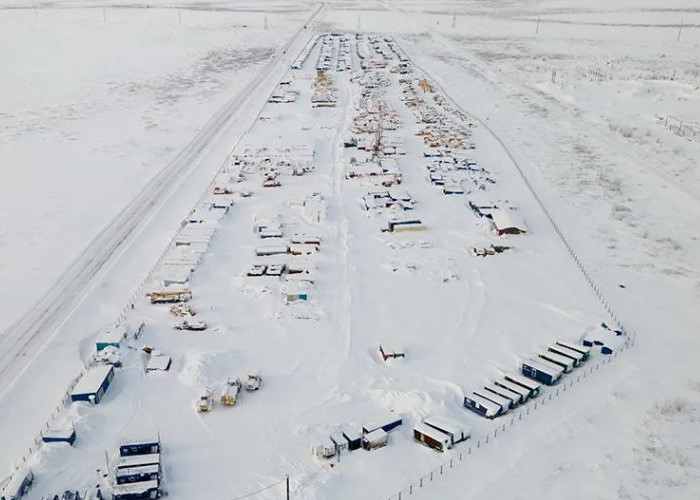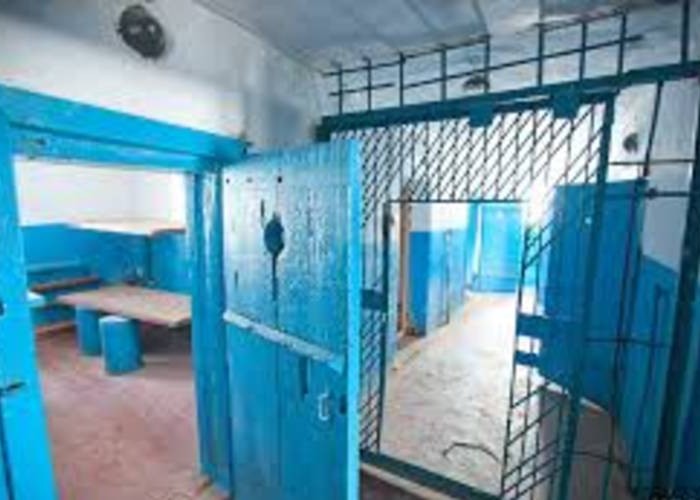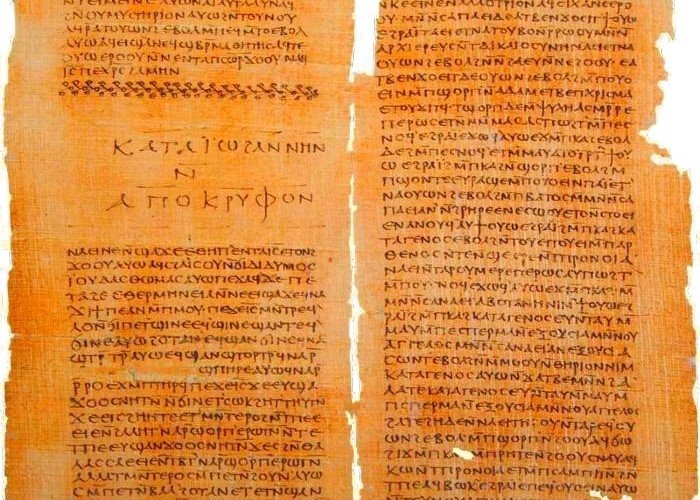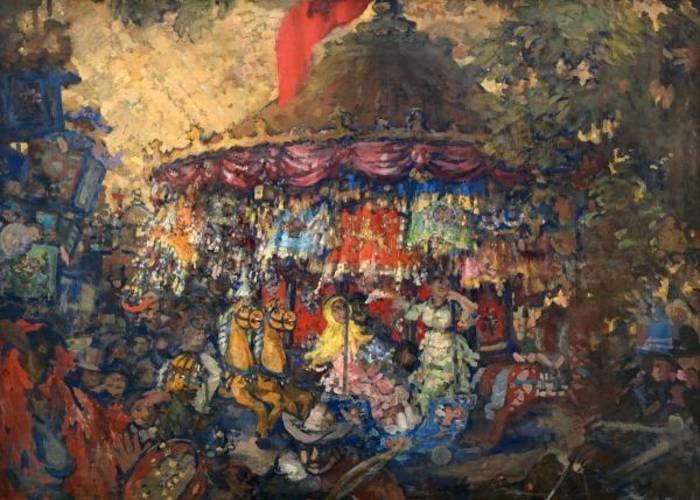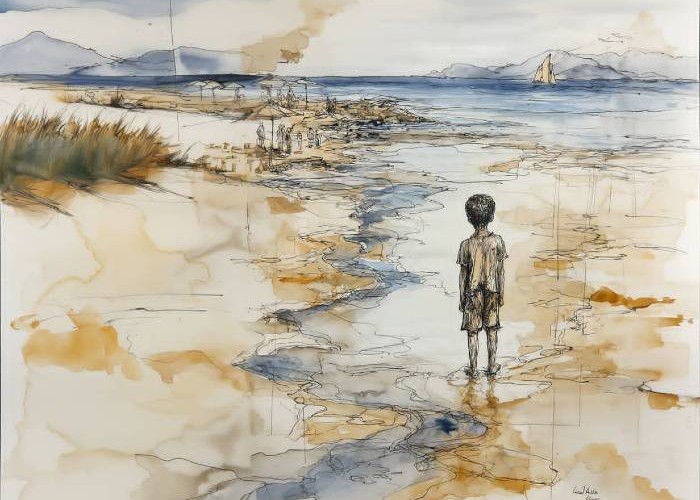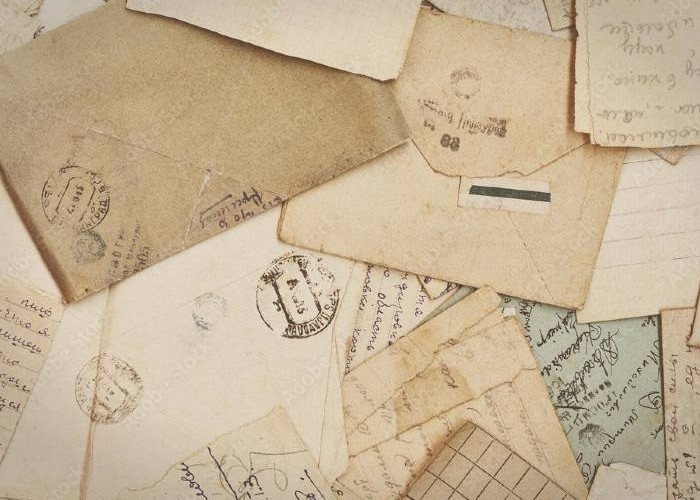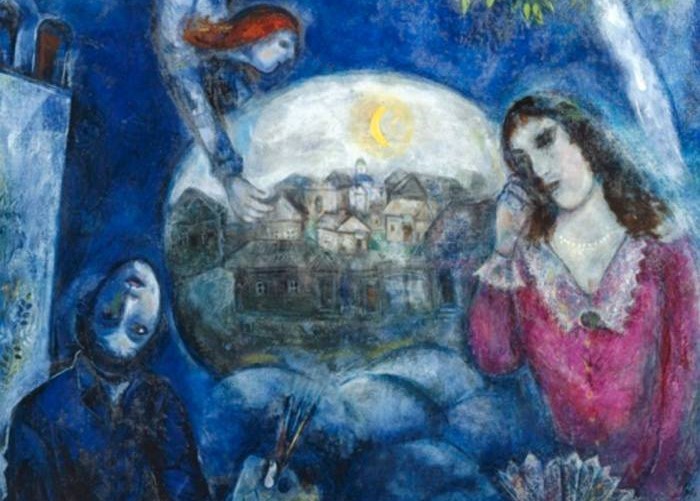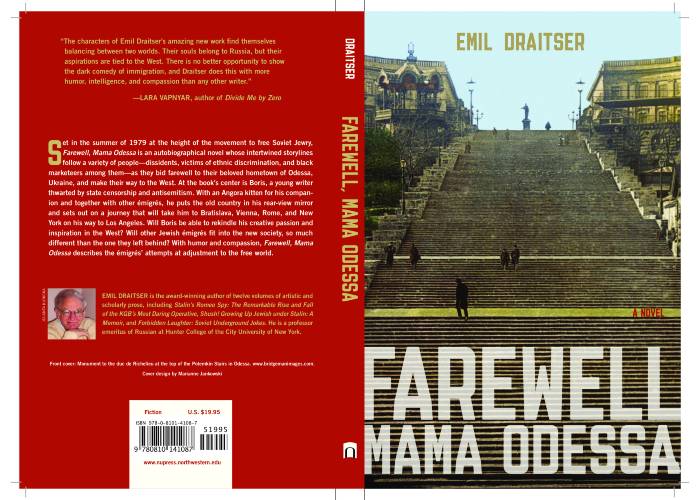From Farewell, Mama Odessa: A Novel
The next day, having settled in Ostia, Boris went back to Rome by a commuter train. The weather was hardly proper for an outing. It drizzled. The gray felt of the clouds upholstered the skies all over. However, Boris remembered his cousin Ilya’s advice – to see as much of Italy as possible while he was here. Who knows how will his American life turn out? How soon would he be able to visit the beauties of Rome again?…
On the train, on the next bench, sat a short, lean, and brawny man in his early forties. He slouched a bit, holding his knee with both hands, lost in reflection. When for a moment he changed the knee, a tattoo in the shape of an anchor flashed on his wrist. He was the same émigré Boris had seen in the corridors of the Joint.
The man’s name was Grigory, but his surname was unusual – Aus. It didn’t seem Jewish. Unlike other émigrés who adjusted slowly to living in an unfamiliar place and foreign everyday life, Aus handled the Italian life with surprising ease. And his supply of Italian words was richer than the minimal vocabulary of other émigrés. They used a limited amount of words and phrases needed for survival. To that end, they consulted the pocket phrasebook with the canary yellow cover supplied by the Joint. To ask for directions or to inquire about some item’s cost: Quanta costa?. Often, the international language of gestures using fingers sufficed to figure it out.
It soon became clear that Aus was also a resident of Odessa, a ship mechanic in his past who had traveled abroad for several years. He used to visit Italy and other countries. Such a colorful background… For an ordinary Soviet person, a trip even to socialist Bulgaria was a rare luxury. And here, look at him!. A wandering Jew at the government expense… Many émigrés wanted to talk to him under some pretext. Was he a real person or some fancy-pants who had invented such a romantic biography for himself?
In response to pestering inquiries, Aus had just shrugged and said there was nothing special about his biography. And in general, he wouldn’t have seen any foreign lands if the Russian people weren’t so bent on getting plastered… Boris hadn’t had a chance to find out what he had in mind. What did alcohol consumption by unknown Russian people have to do with it? How was a Soviet Jew able to cross state borders in those pre-emigration times?
Now, seeing this man in the car of the commuter train, Boris sat next to him — luckily, because of bad weather, the carriage was half empty. Boris introduced himself and admitted he was curious to learn more about something he, Aus, had said. Namely, what does the Russian love for drinking have to do with his career as an overseas sailor?
Aus looked outside the carriage window. It still drizzled. He sighed and nodded, signaling he was ready to satisfy the inquisitiveness of the former Moscow journalist. It was a long story, but if the young man was so eager to find out… Aus spoke with little enthusiasm. It seemed he was telling his story not for the first time.
“My mother was Estonian,” he said. “I have her last name. I believe some surnames point to a person’s dominant character trait. This is the case with mine. In Estonian, Aus means ‘honest.’ As you know, in the country we’ve left, it also means “being out of one’s mind,” or, as they have it in Odessa, “one’s marbles got scattered all over,” shariki za roliki zaekhali. It’s true: who, in his right mind, would ever tell the truth and nothing but the truth to Soviet authorities?
“But, thank God, here it’s only rain behind the window, not the Soviet power. I’ll come clean. I’ll tell you as it is,” he lit a cigarette and took a deep draw on it. “I’ll start with the fact that I didn’t have a father. Of course, he existed: my mother wasn’t Virgin Mary.”
Looking around and, not finding an ashtray, Aus shook the ashes of his cigarette into his palm.
“I was born on the wrong side of the blanket, so to speak. An illegitimate child… On my birth certificate, instead of my father’s name, there was a dash… And I don’t remember my mother. I was a baby when, after the Red Army tanks rolled into Estonia, the NKVD, the secret police, arrested her and my grandmother and took them away. They exiled them to Siberia…
“I hope you don’t ask what for. Otherwise, I would suspect you of being a a foreign spy who had been poorly educated about what the Bolsheviks did after they had secured that infamous Molotov-Ribbentrop Non-aggression Pact… Like the Nazis, when capturing new territory, the Soviets went after Estonian intellectuals, no matter how modest their position in the country was. As far as I know, both my mother and my grandmother were school teachers. For the occupants, it was a practical matter. Any possible dissent complicates their rule. Once you remove a nation’s brain, it’s so much easier to handle the rest of the population…
“So, the NKVD stuck both my mother and grandmother with the notorious article 58 of the Soviet Criminal Code — anti-Soviet propaganda and agitation. They wanted to put me in an orphanage, but my aunt, my mother’s sister, won me back somehow. She raised me. She later married another Estonian man who lived in Odessa and moved there.
“Well, then… Neither my mother nor my grandmother returned from Siberia. They perished there. Later on, when Khrushchev’s rehabilitation campaign of people wrongly accused under Stalin began, I made sure they dismissed charges against my mother. I received a sealed document that said, posthumously, “for lack of corpus delicti”. And so on. Well, when I rummaged through her papers, which she had managed to pass on to my aunt before her arrest, I found her letters to my father who was a Jew. One Grigory Zaltsman… It looks like my mother was in love with the man. She’d named me after him.
“So, I made sure they corrected my birth certificate. For me, then a young man, it was shameful having merely a dash where my father’s name was supposed to be.”
Aus grinned gloomily.
“By the time I had to renew my internal passport, they told me at the police station that, based on my updated birth certificate, I could choose what to have under item five / ethnicity — an Estonian (my mother’s) or my father’s, a Jew. I need not tell you that, faced with this choice, only a total nuts would want to be identified as a Jew in his passport. It’s like hanging yourself by your private parts.
“Of course, I told the passport clerk to write ‘Estonian,’ and to include my patronymic – Grigorievich. And that’s what I’ve been for the rest of my Soviet life, in the army and after it — an Estonian.
“After the army, I finished our Odessa Institute of Engineers of Marine Sea Fleet. I wanted to get a job on some overseas trade ship. To be approved for job-related foreign travel, you need to have a state security clearance. My uncle, the brother of my stepmother’s husband (should I say step-uncle?) was a big shot. He was in charge of one of the Black Sea Shipping Management’s departments. So, I visited him and asked him to take up my case. And he told me point blank, ‘You’ll go overseas only over my dead body!’ He knew my mother had been persecuted as an ‘enemy of the people,’ but I reasoned with him that they had acquitted her. My profile was clean now. I even showed him the sealed government notification. And he turned his head away from the papers like a puppy from mothballs. ‘A certificate, my foot!’ he said. ‘You don’t understand a thing in our life. It doesn’t matter whether she’s been acquitted or not.’
“I was flabbergasted. Didn’t he trust the Soviet authorities who would think nothing to clearing her name, yet still harbor suspicion? Was he afraid they’d dig into his documents and find out his distant relative was once considered an ‘enemy of the people?’ Or that, not even a relative or a lawful husband, but a lover of a sister of his sister-in-law was a Jew? …
“‘Only over my dead body!’ the man told me. Well, he didn’t know he had foretold his destiny. In time, it turned out to be just the way he said it.” Aus shook his head in grief and looked out the window again. It continued to drizzle.
“Well, then… when he turned me down, I worked as a mechanical engineer in a project office at the Shipping Management. I worked like a mule, hunched over my drawing board for several years in a row, getting a meager salary of a young specialist. One hundred and twenty rubles per month – enough to make you scream.
“Then a huge accident happened. A large Soviet cargo ship crashed while trying to moor at the port of Sydney. The captain forgot to remove a stabilizer near the keel which prevents the boat from rolling over during a big wave.”
Aus showed with his hands how small wings were supposed to straighten out under the water.
“The stabilizer hit the mooring pile and crashed into the bilge sheathing. Water poured into the engine room, and soon the whole ship sank… A huge scandal ensued. They put the captain on trial. Together with his assistant and the boatswain. Then they lifted the vessel from the sea bottom and put it up for repairs at the port of Sydney.”
Aus sighed and continued somberly.
“Well, seven months down the road, after they raised the sunken cargo ship and repaired it, my uncle flew to Australia for the official vessel repair approval and acceptance. It went over with great pomp. The crew took part in the celebration. The next day my uncle flew to Moscow with his report to the Minister of the Maritime Fleet… Well, what my uncle didn’t know was that, after he had left, the ship’s crew continued to celebrate their ‘victory on the labor front.’ They did it the Russian way. When they ran out of all their hard currency when buying alcohol, they switched to brake fluid. They got hold of it in a local car repair shop.
“Well, now my uncle reported to the minister about the glorious achievement of the ship’s collective, which had restored one of the best Soviet cargo ships. But the minister was unimpressed. ‘You tell me everything is wonderful,’ he said, looking my uncle in the eye, “Gosh, I wasn’t aware that, in our maritime fleet, we have our own domestic Cicero. I can’t hear enough of it… While in reality, it is far from it. Why did you keep this news from me?’
“And with these words, he slapped a telegram on his desk for my uncle to read. The telegram stated that, after filling themselves with brake fuel to the eyeballs, three crew members had dropped dead right there and then, two more had been close to joining them, and three more had lost their sight and taken to a local hospital.
“After reading the telegram, my uncle returned to his hotel, where he had a heart attack. He died a few days later.”
Aus sighed, went silent for a while, then continued sullenly:
“They buried the man… Well, over time, things settled down, and I resumed my quest for an overseas job. I talked to my uncle’s secretary, who had a new boss now. She wanted to help me, perhaps in memory of my late uncle. Through an acquaintance of hers, another secretary, she placed a call to the First Secretary of the Regional Committee and explained everything. That my personal case was whistle clean because my mother’s name had been officially cleared. And so on. She said to me, ‘Now you wait.’
“Man, I waited nine long months. They needed nine damned months to decide on my case. During this time, one could conceive a baby and give birth to it… I had a friend who worked at a local KGB office. We grew up together. He was reporting to me on the progress of my case.
“At last, I received my clearance. I sailed as a mechanic. First, on a freighter. When I crossed the Bosporus Strait for the first time, I cried. It took so many years for that to happen. First, I worked on a few short lines that lasted from two to four weeks. We sailed around the Mediterranean. Visited Greece… Italy… Egypt… Later on, they transferred me to a Soviet cruiser.”
“So, how was Egypt?” Boris said. “Have you seen the pyramids of Cheops?”
“The pyramids?” Aus stared at Boris, his eyes wide as if he had asked him an idiotic question. “What are you talking about? Heavens, no! Pyramids – what the hell are you talking about? They gave us just enough time to get to the local shops in Alexandria. For twenty exchange rubles, I could buy a few T-shirts, folding umbrellas, and a package or two of women’s underwear called a ‘weekly set,’ nedel’ka. My salary was enough to make a cat laugh, but now I brought stuff back to Odessa from my trips and sold it.”
“Oh, yes, yes,” Boris remembered. “The Odessa consignment shops…”
“Yes, there,” Aus nodded sadly. “And on the flea market… Wherever I could…”
He waved his hand as if to say this goes without saying.
“Yes, I stood with my stuff at that market for hours. I felt humiliated. I wrapped myself in a scarf. Turned my head away when I saw my Odessa neighbors in the crowd.”
And Aus showed Boris how he raised the collar of his coat, so they wouldn’t recognize him.
“What else could I do! How else could I make a living? Every year the same thing over and over… It made me sick. I thought of defecting during the forthcoming trip to Istanbul. I even learned how to pronounce ‘I want to defect’ in Turkish,’ Burada kolmak istiyorum.” Aus smiled faintly. “Thank God, soon after the opportunity to emigrate have opened. Now I could leave the country legally.”
“Well,” Boris said, “aren’t you an Estonian according to your Soviet passport? Nowadays, it isn’t easy to emigrate from the USSR if you aren’t Jewish.”
“You’re right,” Aus said. “I’m not a Jew by Halakha, the Jewish law. That is, I’m a not considered a Jew on my mother’s side. But, by Soviet law, I’m a Jew because of my father. Once I had thought of emigration, I began to go over my papers again. I started, so to speak, to ‘Jewify’ myself. My passport and other matters… Luckily, my birth certificate shows my father was Grigory Zaltsman.”
And, for the first time, a smile lit up Aus’ face.
“It looks like, in the long run,” he said, “by stepping over prejudice, by following her heart, my mother had given me the best gift – a pass to freedom.”
“Stazione Termini,” a man’s voice came over the train intercom, “Tutti escono.”
